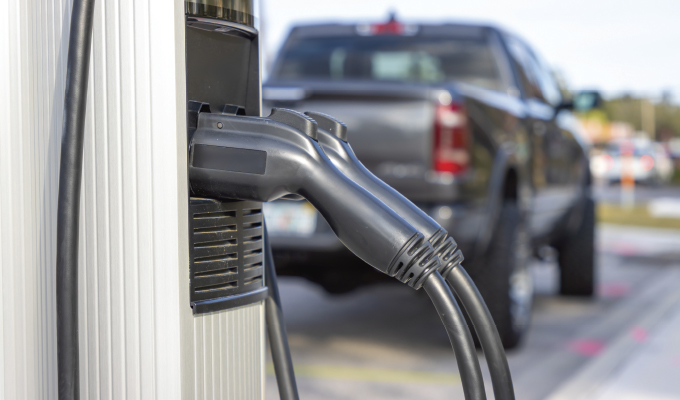Electric vehicles (EVs) are the future of fleets. Today, construction fleets are electrifying at lightning speed; a trend that will accelerate as more medium- and heavy-duty electric trucks hit the road in the coming years. But transitioning to an electric fleet is more complicated than just plugging EVs into the mix. Despite benefits including reduced emissions, fueling costs, and a lower total cost of ownership, electric vehicles add a brand-new set of complexities to an already complex ecosystem. That’s why an integrated software platform is essential for streamlining and managing the shift to electric drive.
UNLOCKING A LOWER TCO
Electric vehicles offer fleets several advantages over their internal combustion engine (ICE) counterparts, including lower fuel and maintenance costs, which result in a lower total cost of ownership (TCO) over the life of a vehicle. But charging several EVs, each with its own schedule, can be challenging and could result in extensive (and expensive) infrastructure upgrades. Charging multiple vehicles at the same time can also put pressure on the power grid, especially during peak loads, further increasing your costs. The answer? Software. The same advanced technology platform that helps you streamline operations also enables you to control energy management, allowing you to remotely control when, for how long and how fast a vehicle charges—increasing the efficiency of your current charging infrastructure and decreasing electricity costs. It even allows you to set a power ceiling, so you never trigger costly demand charges for electricity.
OPTIMIZING OPERATIONS
Because construction fleets operate on tight schedules, vehicles and systems must be optimized to meet mission-critical demands. If a single vehicle is out of service because the battery is insufficiently charged, it can disrupt an entire operation. Whether it’s due to a driver forgetting to plug in or if there’s a problem with the battery itself, the impact will be felt throughout the jobsite. That’s why having access to crucial information such as accurate range forecasts, live vehicle status and location details, data regarding unnecessary idling and charging station status is essential to staying on schedule and on budget. Exchanging data with and between existing systems is the key to unlocking the full potential of an e-fleet.
SIMPLIFYING MANAGEMENT
General contractors will likely manage a mix of vehicle makes and models with different propulsion systems including gas, diesel, electric, and plug-in hybrid models. Additionally, electric and PHEV vehicles may rely on an assortment of AC and DC fast charging stations from a variety of manufacturers at depots, drivers’ homes, on-site, and everywhere in between. This complexity can quickly turn into a management headache, as both vehicles and charging stations require monitoring. An integrated solution, including tools that can readily exchange charging data, allows you to efficiently manage energy, improve charging port accessibility, and employ networked charging processes to fully utilize existing infrastructure—often in real time. Fleet management software also helps further reduce costs while increasing vehicle uptime.
GETTING IT RIGHT
At the very least, any software platform should include tools capable of collecting and managing data across both vehicles and charging stations. To fully optimize your EV fleet operations, it should also include the following:
- Asset health and battery monitoring
- Energy management capabilities
- Improved access to charging stations and ports, regardless of type or manufacturer
- Proactive management tools
- Real-time monitoring and role-based alerts
- Visibility into on-route charging through an intuitive mobile app
- Easy payment via partnerships with top fuel card providers
Technology helps you unlock the full potential of your EV or multi-asset fleet, lowering operational costs, minimizing disruptions, and protecting your investment.
CLOSING THOUGHT
From tools that optimize driver efficiency to increase range to proactive monitoring that can identify issues and prolong battery health and life, an advanced fleet management platform can mean the difference between a smooth transition to EVs or a logistical nightmare. This is why ChargePoint announced the expansion of its fleet management product line that can help fleet operators streamline their operations, achieve a lower total cost of ownership, and ease the transition to EVs. General contractors can manage their fleet using accurate, up-to-the-second data on vehicles, routes and charging station locations and data. Add real-time visibility into vehicle locations, remaining range and the ability to identify which chargers are available and when, which means you can spend more time doing your job and less time managing your fleet.

About the Author:
James Griffin is senior director of fleet, North America, at ChargePoint. Prior to joining ChargePoint, he worked for Murphy-Hoffman Company, Ryder System, Paccar, Inc., and Delta Air Lines. During his career, Griffin has worked with automotive dealers, vendors and major fleet companies in various roles, including customer logistics manager, director of national sales, and vice president of business development. Over the last decade, he has been an active member of the Council of Supply Chain Management Professionals. He is a Certified Transportation Professional (CTP) issued by the National Private Truck Council. For more, visit www.chargepoint.com.
Modern Contractor Solutions, January 2024
Did you enjoy this article?
Subscribe to the FREE Digital Edition of Modern Contractor Solutions magazine.



